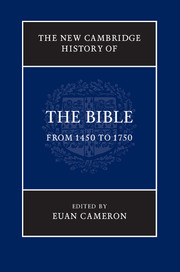Book contents
- Frontmatter
- Contents
- List of figures
- List of contributors
- Preface
- List of abbreviations
- Introduction
- PART I RETRIEVING AND EDITING THE TEXT IN EARLY MODERN EUROPE
- PART II PRODUCING AND DISSEMINATING THE BIBLE IN TRANSLATION
- PART III PROCESSING THE BIBLE: COMMENTARY, CATECHESIS, LITURGY
- 16 Authority
- 17 Theories of interpretation: The quadriga and its successors
- 18 The importance of the Bible for early Lutheran theology
- 19 The Bible in Reformed thought, 1520–1750
- 20 The Bible in Roman Catholic theology, 1450–1750
- 21 Orthodox biblical exegesis in the early modern world (1450–1750)
- 22 The Bible in the pulpit, 1500–1750
- 23 The Bible in catechesis, c. 1500– c. 1750
- 24 The Bible in liturgy and worship, c. 1500–1750
- PART IV THE BIBLE IN THE BROADER CULTURE
- PART V BEYOND EUROPE
- Afterword
- Select bibliography
- Select Bible bibliography
- Index
17 - Theories of interpretation: The quadriga and its successors
from PART III - PROCESSING THE BIBLE: COMMENTARY, CATECHESIS, LITURGY
Published online by Cambridge University Press: 05 August 2016
- Frontmatter
- Contents
- List of figures
- List of contributors
- Preface
- List of abbreviations
- Introduction
- PART I RETRIEVING AND EDITING THE TEXT IN EARLY MODERN EUROPE
- PART II PRODUCING AND DISSEMINATING THE BIBLE IN TRANSLATION
- PART III PROCESSING THE BIBLE: COMMENTARY, CATECHESIS, LITURGY
- 16 Authority
- 17 Theories of interpretation: The quadriga and its successors
- 18 The importance of the Bible for early Lutheran theology
- 19 The Bible in Reformed thought, 1520–1750
- 20 The Bible in Roman Catholic theology, 1450–1750
- 21 Orthodox biblical exegesis in the early modern world (1450–1750)
- 22 The Bible in the pulpit, 1500–1750
- 23 The Bible in catechesis, c. 1500– c. 1750
- 24 The Bible in liturgy and worship, c. 1500–1750
- PART IV THE BIBLE IN THE BROADER CULTURE
- PART V BEYOND EUROPE
- Afterword
- Select bibliography
- Select Bible bibliography
- Index
Summary
Introduction
Early modern biblical interpretation was fundamentally shaped by the intertwined movements of humanism and Reformation, and common understanding of ancient and medieval Christian biblical interpretation has been shaped by those movements as well. According to the resulting narrative, biblical interpretation in the sixteenth century broke emphatically with medieval traditions, abandoning the fancy of allegory and the scholastic ‘fourfold sense of Scripture’ for a more rational and even ‘scientific’ emphasis on the plain sense of the text. Certainly many early modern interpreters claimed such a break, and often disparaged medieval exegetical traditions. But early modern biblical exegesis owed a great deal to the medieval tradition that preceded it. Humanists and Reformation thinkers may have viewed themselves as transcending a moribund scholastic tradition, but they nevertheless used medieval scholarship as a starting point for their own reading of the Bible. The most distinctive aspects of early modern exegesis – an emphasis on the literal sense of Scripture and a careful attention to original biblical languages – had a basis in medieval Bible scholarship. A particularly important resource for early modern scholars was Nicholas of Lyra (c. 1270–1349), whose Postilla litteralis super bibliam emphasised the literal sense of Scripture and the importance of the Hebrew Bible and rabbinic tradition in discerning it. Although later exegetes approached the Bible with a different sensibility, their very concept of literal reading was part of the legacy of ancient and medieval biblical scholarship.
Early modern Christian exegetes were heirs to a complicated hermeneutical tradition developed over the course of centuries and ostensibly based on a fourfold division of meaning. The fourfold sense of Scripture, a product of the early church, was based in the first instance on a twofold division between the literal (sometimes also called historical) sense and the spiritual sense, as expressed, for example, in Paul's second letter to the Corinthians and in the writing of the Greek exegete Origen (c. 184–254). Early on, exegetes began to draw additional distinctions within the spiritual sense, constructing threefold or fourfold hermeneutical schemes. Origen elaborated a threefold understanding of Scripture, distinguishing between literal, allegorical and moral senses, and Gregory the Great (c. 540–604) famously followed this model.
- Type
- Chapter
- Information
- The New Cambridge History of the Bible , pp. 418 - 438Publisher: Cambridge University PressPrint publication year: 2016
- 1
- Cited by

